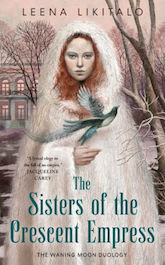The second half of Leena Likitalo’s Waning Moon Duology, The Sisters of the Crescent Empress, picks up directly from the close of the prior book (reviewed here). The five sisters have been sent to Angefort, confined to an isolated estate where exiled royals often find their ends in the Empire—and the house is as haunted as its new charges are. In the capitol the usurper, Gagargi Prataslav, feeds souls to his Great Thinking Machine to run the calculations of a truly equal division of empire while a civil war rages on.
Celestia is weakened from the loss of a portion of her soul; Elise’s combination of guilt and moral righteousness weigh her down; Sibilia is neither girl nor woman, trapped in age between the two pairs of her sisters; Merile is old enough to know that something is terribly wrong but not old enough to understand it; Alina’s grasp on her physical self instead of the world of ghosts and shadows is tenuous at best. The girls must attempt to work among themselves to design an escape and a return—if it’s even possible.
Spoilers follow.
Buy the Book


The Sisters of the Crescent Empress, much like the preceding novel in the duology, has promise but doesn’t quite deliver. The pacing and conclusion of the narrative arc leave the reader off-center, as if they’ve missed a step at the end of the staircase and found themselves abruptly unbalanced. While I’ve got no problem with novels that focus not on the physical action or end results of the plot but on emotional development and character interaction, having spent two full cycles of book with these characters, I expected more.
The ending is, perhaps, the sticking point. While it offers closure of a sort—the end of the unit of five sisters, with one executed and two soul-switched into the bodies of dogs—it doesn’t offer much resolution to the plot. If the novels in the duet had contained a greater focus on the family narrative and less on the Empire’s politics, this wouldn’t be notable, but as it stands it left me with the sense that there should be another novel to wrap up the unfinished story. I suspect the intention was to create a bittersweet conclusion pointing toward an uncertain future, which is generally something I find satisfying in novels like these, but in this case there were a few too many threads left ungathered to provide the necessary balance for that to succeed completely.
Not to put too fine a point on it, but The Sisters of the Crescent Empress ends on a cliffhanger without a resolution forthcoming in the near future. This is not a trilogy; it is a duet. On the one hand, the story of the sisters is complete in a sense: the family has dissolved. On the other, Likitalo’s tale of politics and empire is more than just unresolved—it’s complicated further at the close, in a manner that leaves the threads open to be picked up. This lack of balance between the two narratives gives me the sense that the writer herself wasn’t entirely confident in what these novels were intended to accomplish at the close.
However, despite the odd shape of the narrative and its difficulty focusing the lens on the relevant arc, the interior story we do receive a conclusion to is well-handled. The melancholy and pain of these young girls trapped in the house that will see their ends is rendered with lush and awful detail by Likitalo; it’s an extremely emotional novel, and in those terms, it succeeds wildly. The same attention to gender, politics, and power present in the first book develops to a richer concentration here.
The conflicts between sisters—some petty, some raw and deeper than blood runs—and their attempts to forge together to succeed are the strongest thing here. Elise’s determination to make Celestia see that she cannot rule as their mother did, that she must consider the people, is undaunted. Meanwhile, Celestia’s desire to rule and to protect her family, her compulsion to stand apart, blind her to solutions that she cannot find without help. The ghosts of the executed royals before them, Irina and Olesia, offer their own advice and counsel.
In the end, Sibilia gives her life for her sisters’ lives. It is poignant and intense, coming as it does after the faux debut ball the guards and her sisters throw for her. She had never been kissed; she accepts that she never will be, and that she will die young and useful, leaving the words of her journal only behind for memories. Sibilia, perhaps, is the best character—the one who develops the most and stretches the furthest, creates the most dynamic friction and emotional investment for the reader.
Her death is the ending of the ending. Whether the empire shifts to Celestia and her divine writ with Elise’s tempered socialism to assist, or whether Elise betrays Celestia because she does not think her fit to rule, or whether both sisters fail to prevent the social order collapsing and reforming without a royal family in it—we won’t know. That is a choice, narratively, that I do respect (though I have my complaints about execution). As readers, the final thing we can take is the loss of life and the loss of potential, the brutality of the gunfire still in earshot of the escaping sisters.
Likitalo’s grasp on emotional narrative is solid, her prose provocative, her beats of action and suspense compelling. While I’ve yet to be satisfied with an ending, in either of these two novels, they’re still good reads—though I’d be prepared to leave a bit unbalanced by the off-kilter landing. But The Sisters of the Crescent Empress does tie off some threads to strong effect, and for that, it’s worth giving a look.
The Sisters of the Crescent Empress is available from Tor.com Publishing.
Lee Mandelo is a writer, critic, and editor whose primary fields of interest are speculative fiction and queer literature, especially when the two coincide. They have two books out, Beyond Binary: Genderqueer and Sexually Fluid Speculative Fiction and We Wuz Pushed: On Joanna Russ and Radical Truth-telling, and in the past have edited for publications like Strange Horizons Magazine. Other work has been featured in magazines such as Stone Telling, Clarkesworld, Apex, and Ideomancer.










